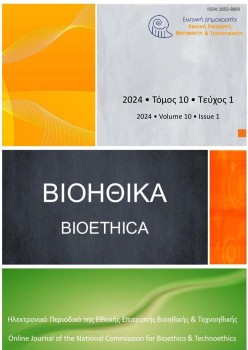The ethical and legal dilemmas of Telepsychiatry

Abstract
This paper was written in the framework of my internship at the National Commission for Bioethics and Technoethics of the Hellenic Republic. It constitutes an attempt at exploring the ethical and legal dilemmas of the medical practice of telepsychiatry. Telepsychiatry, as well as other forms of telemedicine, has become a prevalent way through which patients gain access to healthcare and with many research papers reporting on its effectiveness and advantages, telepsychiatry has gained a lot of proponents in the scientific and healthcare community. However, several questions regarding the ethical and legal nature of the practice remain unanswered and this can put patients and other users of telemental health services under risk for basic rights violations. In this paper, at first the scientific data supporting the use of telepsychiatry will be cited. In addition to that, there will be discussion of several ethical dilemmas that have been reported concerning the use of telemedicine in psychiatry during the past few years and there will be reference to the medical code of ethics. Following that, there will be reference to the existing legislation for telepsychiatry in Greece and the legal issues that can arise will be analyzed. In spite of the fact that the advantages and ethical pitfalls of telepsychiatry are common in many countries, the focus of this paper will be on Greece’s code of medical ethics and legislation due to the lack of relevant bibliography on the matter, even though telepsychiatry is widely used by Greek patients. Finally some suggestions will be made on what ought to be ameliorated in regards to the current conditions, so as to make sure telepsychiatry is in line with the basic principles of bioethics.
Article Details
- How to Cite
-
Chatzi, M. (2024). The ethical and legal dilemmas of Telepsychiatry. Bioethica, 10(1), 43–57. https://doi.org/10.12681/bioeth.37389
- Section
- Reviews

This work is licensed under a Creative Commons Attribution 4.0 International License.
Authors who publish with this journal agree to the following terms:
- Authors retain copyright and grant the journal right of first publication with the work simultaneously licensed under a Creative Commons Attribution CC BY 4.0 License, which allows for immediate free access to the work and permits any user to read, download, copy, distribute, print, search, or link to the full texts of articles, crawl them for indexing, pass them as data to software, or use them for any other lawful purpose. Appropriate credit must be given by citing the author(s) and the original publication in this journal.
- Authors are able to enter into separate, additional contractual arrangements for the non-exclusive distribution of the journal's published version of the work (e.g. post it to an institutional repository or publish it in a book), with an acknowledgement of its initial publication in this journal.
We encourage authors to deposit their articles, as well as data underlying the publications, in institutional and/or other appropriate subject repositories.
Bioethica permits and encourages authors to archive the final publication pdf in institutional (e.g. the repository of the National Hellenic Research Foundation) or other appropriate subject repositories (e.g. SSOAR repository for social sciences), in compliance with institutional and/or funder open access policies, after publication in the BIOETHICA. Authors must provide bibliographic details that credit publication in the journal, as well as related funding details (when applicable).
Lists of institutional and other subject-based academic open access repositories can be found listed by country at the registry http://opendoar.org/countrylist.php
If your institution does not possess a repository you may deposit a copy of your paper at no cost with www.zenodo.org , the repository supported for open access research in the EU by the European Commission, through the project OpenAIRE (www.openaire.eu )


